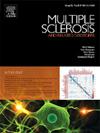Exploring the Potential of Immersive Virtual Reality (VR) as a tool to enhance cognitive functions and alleviate clinical symptoms in Multiple Sclerosis (MS)
IF 2.9
3区 医学
Q2 CLINICAL NEUROLOGY
引用次数: 0
Abstract
People with multiple sclerosis (PwMS) suffer cognitive and motor impairments that significantly impact their work life and daily functioning. Because virtual reality (VR) technologies have shown promise in the field of neurorehabilitation, in this study we developed a VR-based cognitive training program and assessed whether it could improve cognitive functioning in a cohort of PwMS (n = 33) and healthy control participants (n = 26). We observed that, in both groups of participants, repeated practice led to a day-by-day increase in correct responses and a progressive reduction in errors in the VR task. More importantly, as revealed by comparisons of the participants’ pre- and post-training scores, practice in the VR task also significantly improved performance in non-trained neuropsychological tests working assessing memory, information processing speed, and upper limb motor functions. Taken together, these findings suggest that training programs using VR technologies can positively impact both cognitive and motor functions in multiple sclerosis, thus offering new tools to prevent or attenuate the cognitive and motor decline experienced by PwMS.
探索沉浸式虚拟现实(VR)作为增强多发性硬化症(MS)认知功能和缓解临床症状工具的潜力:使用虚拟现实增强多发性硬化症的认知功能。
多发性硬化症(PwMS)患者患有认知和运动障碍,严重影响他们的工作生活和日常功能。由于虚拟现实(VR)技术在神经康复领域显示出前景,在本研究中,我们开发了一种基于VR的认知训练计划,并评估了它是否能改善PwMS (n = 33)和健康对照组(n = 26)的认知功能。我们观察到,在两组参与者中,重复练习导致VR任务中正确反应的逐日增加和错误的逐步减少。更重要的是,通过比较参与者训练前和训练后的得分,VR任务中的练习也显著提高了非训练神经心理测试的表现,包括评估记忆、信息处理速度和上肢运动功能。综上所述,这些发现表明,使用VR技术的训练计划可以对多发性硬化症患者的认知和运动功能产生积极影响,从而为预防或减轻多发性硬化症患者的认知和运动功能下降提供了新的工具。
本文章由计算机程序翻译,如有差异,请以英文原文为准。
求助全文
约1分钟内获得全文
求助全文
来源期刊

Multiple sclerosis and related disorders
CLINICAL NEUROLOGY-
CiteScore
5.80
自引率
20.00%
发文量
814
审稿时长
66 days
期刊介绍:
Multiple Sclerosis is an area of ever expanding research and escalating publications. Multiple Sclerosis and Related Disorders is a wide ranging international journal supported by key researchers from all neuroscience domains that focus on MS and associated disease of the central nervous system. The primary aim of this new journal is the rapid publication of high quality original research in the field. Important secondary aims will be timely updates and editorials on important scientific and clinical care advances, controversies in the field, and invited opinion articles from current thought leaders on topical issues. One section of the journal will focus on teaching, written to enhance the practice of community and academic neurologists involved in the care of MS patients. Summaries of key articles written for a lay audience will be provided as an on-line resource.
A team of four chief editors is supported by leading section editors who will commission and appraise original and review articles concerning: clinical neurology, neuroimaging, neuropathology, neuroepidemiology, therapeutics, genetics / transcriptomics, experimental models, neuroimmunology, biomarkers, neuropsychology, neurorehabilitation, measurement scales, teaching, neuroethics and lay communication.
 求助内容:
求助内容: 应助结果提醒方式:
应助结果提醒方式:


